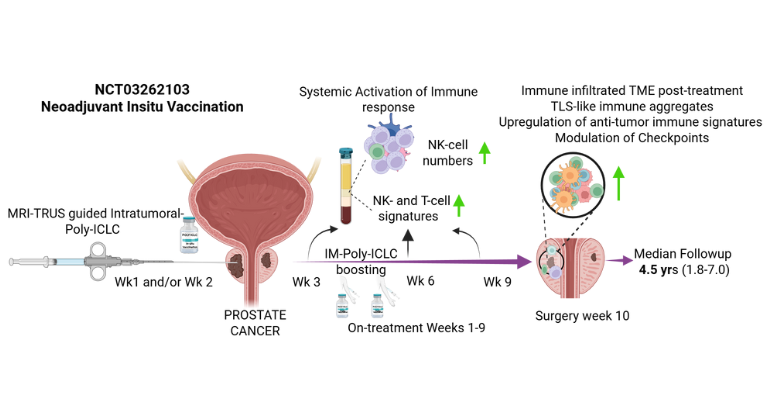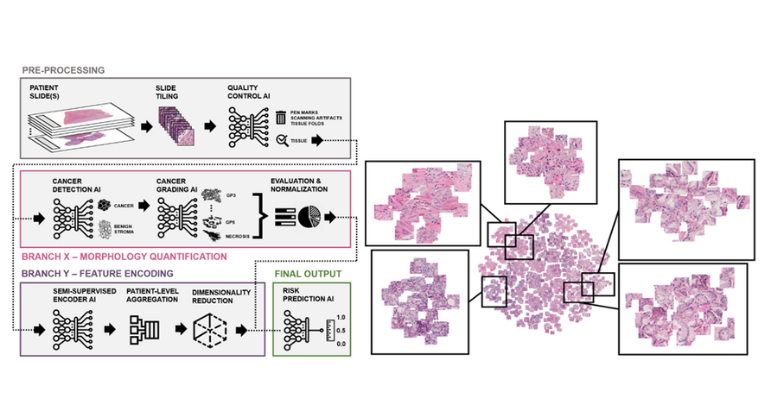Presence of Pelvic Inflammation in Prostate Cancer Patients May Drive Cancer Recurrence or Cancer Spread, Mount Sinai Study Finds

Journal: Cancers
Paper Title: “Association between Incidental Pelvic Inflammation and Aggressive Prostate Cancer”
First and Corresponding Author: Dimple Chakravarty, PhD, Assistant Professor of Urology, Icahn School of Medicine at Mount Sinai
Senior Author: Ashutosh Tewari, MD, Chair of Urology, Mount Sinai Health System
Background on the Condition: Inflammation is a known driver of carcinogenesis which is the initiation of cancer formation. A Mount Sinai research team observed that prostate cancer patients with pelvic inflammation had poor outcomes. This is the first study to look at the link between pelvic inflammation and prostate cancer biology and outcomes.
What the Paper is About: This study reports a significant association of pelvic inflammation with advanced prostate cancer in a large cohort of men undergoing robot-assisted laparoscopic prostatectomy (RALP) for localized prostate cancer. Prostate cancer patients with pelvic inflammation had elevated expression of inflammation-associated genes and cancer-driving pathways in their tumors. Increased systemic inflammation with activation of the IL6-STAT pathway was seen in prostate cancer patients with pelvic inflammation. The presence of pelvic inflammation in prostate cancer patients suggests aggressive disease with a potential to develop biochemical recurrence and metastasis. This study is highly relevant as it allows us to closely follow prostate cancer patients with pelvic inflammation for metastasis. It also suggests that inhibiting the STAT-IL6 pathway would benefit these patients.
Bottom Line: Pelvic inflammation was associated with adverse pathology and higher biochemical recurrence rates in prostate cancer patients. Prostate cancer patients with pelvic inflammation had elevated expression of inflammation-associated genes and cancer-driving pathways in their tumors that drive reoccurrence or metastasis.
Why the Research is Important: Tumor inflammation promotes prostate cancer carcinogenesis. However, the implications of pelvic inflammation and its effect on prostate cancer have never been studied. In this study, researchers retrospectively investigated the association of pelvic inflammation with PCa aggressiveness and its impact on oncological outcomes in a large cohort of men undergoing RALP for localized PCa. Overall, pelvic inflammation was a significant predictor of AP in both univariate and multivariate analyses.
Quotes: “We have observed that prostate cancer patients with adhesions or scar tissues had a higher likelihood of aggressive disease. With further in-depth analysis, we discovered that pelvic inflammation is a driver of aggressive prostate phenotype. Until now, chronic inflammation within the prostate was considered a significant contributor to prostate cancer progression. However, our studies, for the first time, demonstrate that inflammation away from the prostate could be equally important. Therefore, managing inflammation in high-risk prostate cancer patients is critical and could be achieved by diet and other intervention strategies,” says Dr. Ash Tewari.
“This study fundamentally contributes to the growing literature demonstrating inflammation’s negative impact on cancer progression. The role of pelvic inflammation in prostate cancer progression has never been studied, and our study in a large cohort of patients provides mechanistic insights that could explain how pelvic inflammation contributes to prostate cancer progression and biochemical recurrence. We are pursuing multi-institutional collaborations to validate our findings in other cohorts. Our long-term objective is to develop blood or urine-based biomarker to monitor inflammation status in our prostate cancer patients,” adds Dr. Dimple Chakravarty, the lead author.
About the Mount Sinai Health System
Mount Sinai Health System is one of the largest academic medical systems in the New York metro area, with 48,000 employees working across seven hospitals, more than 400 outpatient practices, more than 600 research and clinical labs, a school of nursing, and a leading school of medicine and graduate education. Mount Sinai advances health for all people, everywhere, by taking on the most complex health care challenges of our time—discovering and applying new scientific learning and knowledge; developing safer, more effective treatments; educating the next generation of medical leaders and innovators; and supporting local communities by delivering high-quality care to all who need it.
Through the integration of its hospitals, labs, and schools, Mount Sinai offers comprehensive health care solutions from birth through geriatrics, leveraging innovative approaches such as artificial intelligence and informatics while keeping patients’ medical and emotional needs at the center of all treatment. The Health System includes approximately 9,000 primary and specialty care physicians and 10 free-standing joint-venture centers throughout the five boroughs of New York City, Westchester, Long Island, and Florida. Hospitals within the System are consistently ranked by Newsweek’s® “The World’s Best Smart Hospitals, Best in State Hospitals, World Best Hospitals and Best Specialty Hospitals” and by U.S. News & World Report's® “Best Hospitals” and “Best Children’s Hospitals.” The Mount Sinai Hospital is on the U.S. News & World Report® “Best Hospitals” Honor Roll for 2025-2026.
For more information, visit https://www.mountsinai.org or find Mount Sinai on Facebook, Instagram, LinkedIn, X, and YouTube.

Early Clinical Trial Tests Immune-Boosting Therapy Before Prostate Cancer Surgery
Oct 30, 2025 View All Press Releases
New AI Tool by Mount Sinai Researchers Could Reshape Prostate Cancer Care
Sep 23, 2024 View All Press ReleasesMount Sinai Health System Launches Mobile Prostate Cancer Screening Unit in New York City
Apr 01, 2022 View All Press ReleasesMount Sinai and Man Cave Health Launch Sports-Themed Resource Center
Jan 02, 2019 View All Press Releases
